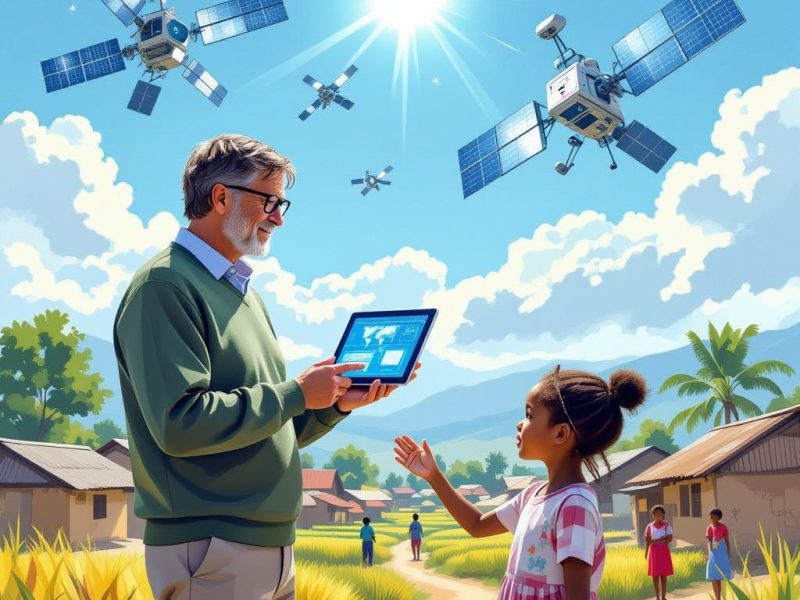Introduction: Beyond Microsoft
Bill Gates is no longer just the guy who revolutionized personal computing. In 2025, he’s the face of next-gen philanthropy—an icon who traded software for syringes, silicon for sanitation, and now algorithms for agriculture. While other billionaires launch rockets or buy social networks, Gates remains grounded—literally—working to improve lives on Earth.
The Bill & Melinda Gates Foundation, despite its occasional controversies, has become a powerhouse in global health, education, and economic development. But in recent years, a new layer has emerged: technological humanitarianism.
Today, we explore Gates’ growing vision: one where AI, biotech, climate science, and predictive data analytics are core tools in the battle against poverty, disease, and inequality.
Bill Gates: The Data-Driven Philanthropist
What separates Gates from many other philanthropists isn’t just his wallet—it’s his obsession with metrics. The Gates Foundation runs like a startup, with KPIs, dashboards, and quarterly reviews. For Gates, charity isn’t about feelings; it’s about impact.
Gates once said, “If I could only understand one thing about a community, it would be the child mortality rate. That tells me more than GDP or income.”
This mindset shaped his early campaigns—mass vaccination, malaria nets, polio eradication, and clean water initiatives. Now, it’s steering the next wave: AI-guided development.
AI Meets Aid: The Gates Foundation 2.0
In a recent interview at the Global Futures Summit, Gates outlined his ambitious pivot: integrating AI and data science into every arm of the Foundation.
1. Predictive Epidemiology
Gates is investing in AI systems that can predict disease outbreaks weeks before they happen, using satellite data, climate patterns, and social media signals. “If we had this during COVID-19,” Gates remarked, “we could have locked down Wuhan before it ever reached Seattle.”
2. Personalized Education
The Foundation has partnered with Khan Academy and OpenAI to develop adaptive AI tutors that adjust to each student’s pace and cultural context. Pilot programs in sub-Saharan Africa have seen literacy jump 40% in under a year.
3. AI in Agriculture
Smallholder farmers in Africa now use AI-based weather prediction apps co-funded by Gates. These tools help plan planting schedules, monitor soil health, and boost yields by up to 60% in drought-prone zones.
Controversy: Too Much Power?
Of course, not everyone is cheering.
Critics argue that Gates holds too much influence over global health policy—without being elected. His decisions can sway WHO recommendations, steer millions in aid, and shape vaccine priorities. “We’ve created a shadow health ministry that’s unelected, unaccountable,” said one former UN advisor.
There’s also concern about the tech-first approach. Is AI the right lens for every humanitarian issue? What about local knowledge, community wisdom, cultural nuance?
And in the post-pandemic era, trust in billionaires is eroding. From vaccine patents to land grabs, Gates has faced tough questions. Still, he remains remarkably open to dialogue, even when it’s uncomfortable.
Climate Philanthropy: A New Frontier
In 2022, Gates released his book “How to Avoid a Climate Disaster.” But it wasn’t just a bestseller—it was a blueprint. Since then, his Foundation and Breakthrough Energy Ventures have invested billions into:
- Clean cement and steel production
- Next-gen nuclear energy (TerraPower)
- Carbon capture startups
- AI-powered forest fire prediction systems
Now, Gates sees climate change not just as an environmental issue, but a humanitarian one. “It’s the poorest who will suffer most from climate instability,” he says. “So solving climate is solving poverty.”
The Gates Model: Data, Delivery, Dignity
What defines the “Gates Model” of global aid?
1. Evidence Over Emotion
Every project is tracked. Every dollar is traced. Feel-good stories are secondary to scalable impact.
2. Innovation + Infrastructure
Gates doesn’t just drop off aid—he builds systems. Warehouses, distribution networks, training modules. His team builds for the long haul.
3. Partnerships Over Paternalism
Increasingly, the Foundation partners with local governments, universities, and African-led tech firms. It’s a move toward more ethical, sustainable giving.
Bill Gates in 2025: What’s Next?
At 69, Gates shows no signs of slowing down. Here are some 2025 highlights:
- Malaria Vaccine Scale-Up: Gates is funding a new production facility in Senegal to distribute the first 100 million doses across Africa.
- Food Crisis AI: A collaboration with the FAO and Google to model drought-driven famine zones up to 6 months in advance.
- Universal Health Records: Backing open-source digital ID and health records for refugees in East Africa.
He’s also experimenting with AI ethics frameworks that embed humanitarian values into algorithms from the design phase. “We must code compassion into the machine,” he recently said.
Mythology of the Modern Philanthropist
In ancient mythology, gods granted fire, flood, and fertility. Today, billionaires wield code, cash, and cloud servers. Bill Gates has become a Promethean figure—not without his flaws—but undeniably transformative.
He’s reshaping how we think about giving. Not as guilt-driven charity, but as data-driven justice. In the universe of aid, he’s trying to write a new cosmology—one where logic and love work side by side.
And whether you admire or mistrust him, one thing is clear: his vision is changing the face of global aid forever.


